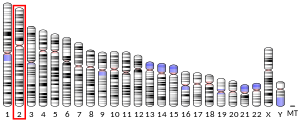Homeobox protein DLX-1 is a protein that in humans is encoded by the DLX1 gene.[5][6]
Function
editThis gene encodes a member of a homeobox transcription factor gene family similar to the Drosophila distal-less gene. The encoded protein is localized to the nucleus where it may function as a transcriptional regulator of signals from multiple TGF-β superfamily members. The encoded protein may play a role in the control of craniofacial patterning and the differentiation and survival of inhibitory neurons in the forebrain. This gene is located in a tail-to-tail configuration with another member of the family on the long arm of chromosome 2. Alternatively spliced transcript variants encoding different isoforms have been described.[6]
References
edit- ^ a b c GRCh38: Ensembl release 89: ENSG00000144355 – Ensembl, May 2017
- ^ a b c GRCm38: Ensembl release 89: ENSMUSG00000041911 – Ensembl, May 2017
- ^ "Human PubMed Reference:". National Center for Biotechnology Information, U.S. National Library of Medicine.
- ^ "Mouse PubMed Reference:". National Center for Biotechnology Information, U.S. National Library of Medicine.
- ^ Simeone A, Acampora D, Pannese M, D'Esposito M, Stornaiuolo A, Gulisano M, Mallamaci A, Kastury K, Druck T, Huebner K, et al. (Apr 1994). "Cloning and characterization of two members of the vertebrate Dlx gene family". Proc Natl Acad Sci U S A. 91 (6): 2250–4. Bibcode:1994PNAS...91.2250S. doi:10.1073/pnas.91.6.2250. PMC 43348. PMID 7907794.
- ^ a b "Entrez Gene: DLX1 distal-less homeobox 1".
Further reading
edit- Letinic K, Zoncu R, Rakic P (2002). "Origin of GABAergic neurons in the human neocortex". Nature. 417 (6889): 645–9. Bibcode:2002Natur.417..645L. doi:10.1038/nature00779. PMID 12050665. S2CID 4349070.
- Strausberg RL, Feingold EA, Grouse LH, et al. (2003). "Generation and initial analysis of more than 15,000 full-length human and mouse cDNA sequences". Proc. Natl. Acad. Sci. U.S.A. 99 (26): 16899–903. Bibcode:2002PNAS...9916899M. doi:10.1073/pnas.242603899. PMC 139241. PMID 12477932.
- Chiba S, Takeshita K, Imai Y, et al. (2004). "Homeoprotein DLX-1 interacts with Smad4 and blocks a signaling pathway from activin A in hematopoietic cells". Proc. Natl. Acad. Sci. U.S.A. 100 (26): 15577–82. doi:10.1073/pnas.2536757100. PMC 307610. PMID 14671321.
- Ota T, Suzuki Y, Nishikawa T, et al. (2004). "Complete sequencing and characterization of 21,243 full-length human cDNAs". Nat. Genet. 36 (1): 40–5. doi:10.1038/ng1285. PMID 14702039.
- Zhou QP, Le TN, Qiu X, et al. (2004). "Identification of a direct Dlx homeodomain target in the developing mouse forebrain and retina by optimization of chromatin immunoprecipitation". Nucleic Acids Res. 32 (3): 884–92. doi:10.1093/nar/gkh233. PMC 373381. PMID 14769946.
- Gerhard DS, Wagner L, Feingold EA, et al. (2004). "The status, quality, and expansion of the NIH full-length cDNA project: the Mammalian Gene Collection (MGC)". Genome Res. 14 (10B): 2121–7. doi:10.1101/gr.2596504. PMC 528928. PMID 15489334.
- Rual JF, Venkatesan K, Hao T, et al. (2005). "Towards a proteome-scale map of the human protein-protein interaction network". Nature. 437 (7062): 1173–8. Bibcode:2005Natur.437.1173R. doi:10.1038/nature04209. PMID 16189514. S2CID 4427026.
- Hamilton SP, Woo JM, Carlson EJ, et al. (2006). "Analysis of four DLX homeobox genes in autistic probands". BMC Genet. 6: 52. doi:10.1186/1471-2156-6-52. PMC 1310613. PMID 16266434.



